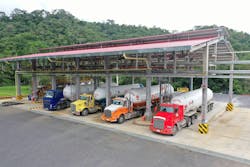Ecopetrol shuts oil production at certain Colombian fields due to blockades, attacks
State-owned Ecopetrol has begun shutting down production at oil fields due to road blockages caused by a truckers' strike against the rising price of diesel.
Due to land blockages in the area, the operator was forced to shut down Caño Sur field in Puerto Gaitán (Meta) after it reached its maximum crude oil storage capacity. With the shutdown, about 45,000 b/d of oil is not being produced. In the coming hours, Llanos Norte fields (Arauca), Tisquirama, San Roque, Aullador in the Magdalena Medio region, and the Cluster 25-Nueva Esperanza field (Meta) will also be shut down.
Also impacted are inventories of liquefied petroleum gas (LPG) accumulating in Cusians and Cupiagua field in Casanare that cannot be transported by road in tanker trucks to delivery points.
“With the increase in blockages, recent terrorist attacks on the Caño Limón Coveñas and Bicentenario pipelines—now totaling 15—and the takeover of the Gibraltar gas plant, the conditions for the hydrocarbon production and supply chain are becoming more complex, posing serious challenges for delivering fuel and getting it to distribution and sales points,” Ecopetrol said.
A blockade maintained by the indigenous U'wa community at Gibraltar field (Toledo, Norte de Santander) caused the shutdown of the gas plant that supplies the northeastern part of the country.
Growing concerns
Despite the blockages, Ecopetrol said a ‘contingency plan’ has allowed it to continue supplying oil and gas and keeping refineries running, but that the situation may change if the blockages and public order disruptions continue.
Ecopetrol had expressed concerns in a release Sept. 4, noting attacks on the Caño Limón Coveñas and Bicentenario pipelines, blockages caused by the truckers' strike, and takeover of the Gibraltar gas plant, had started to impact its ability to transport hydrocarbons.
“The unavailability of the mentioned pipelines, due to the attacks, along with the difficulty in moving tank trucks loaded with hydrocarbons and liquefied petroleum gas (LPG), may impact crude and gas production in the coming days, compliance with the refining diets at Barrancabermeja and Cartagena refineries, and fuel supply at various points across the country,” the company said in the Sept. 4 release.
About the Author
Camilo Ciruzzi
South America Correspondent
Ciruzzi is a journalist based in the Argentine province of Río Negro. He has over 30 years of experience in radio and print media. Ciruzzi studied Communication Sciences at the University of Buenos Aires and specialized in energy, political economy, and finance.
